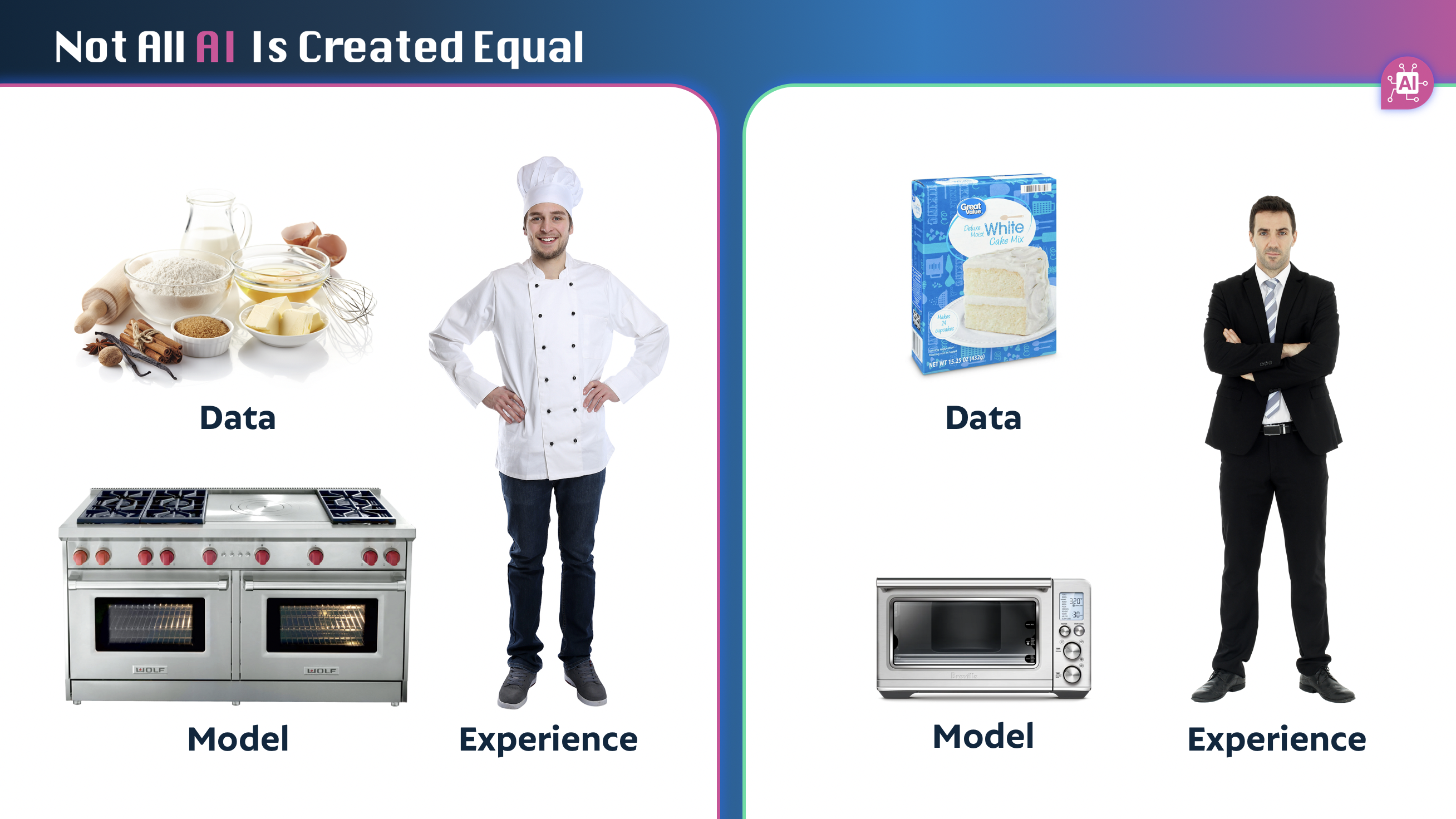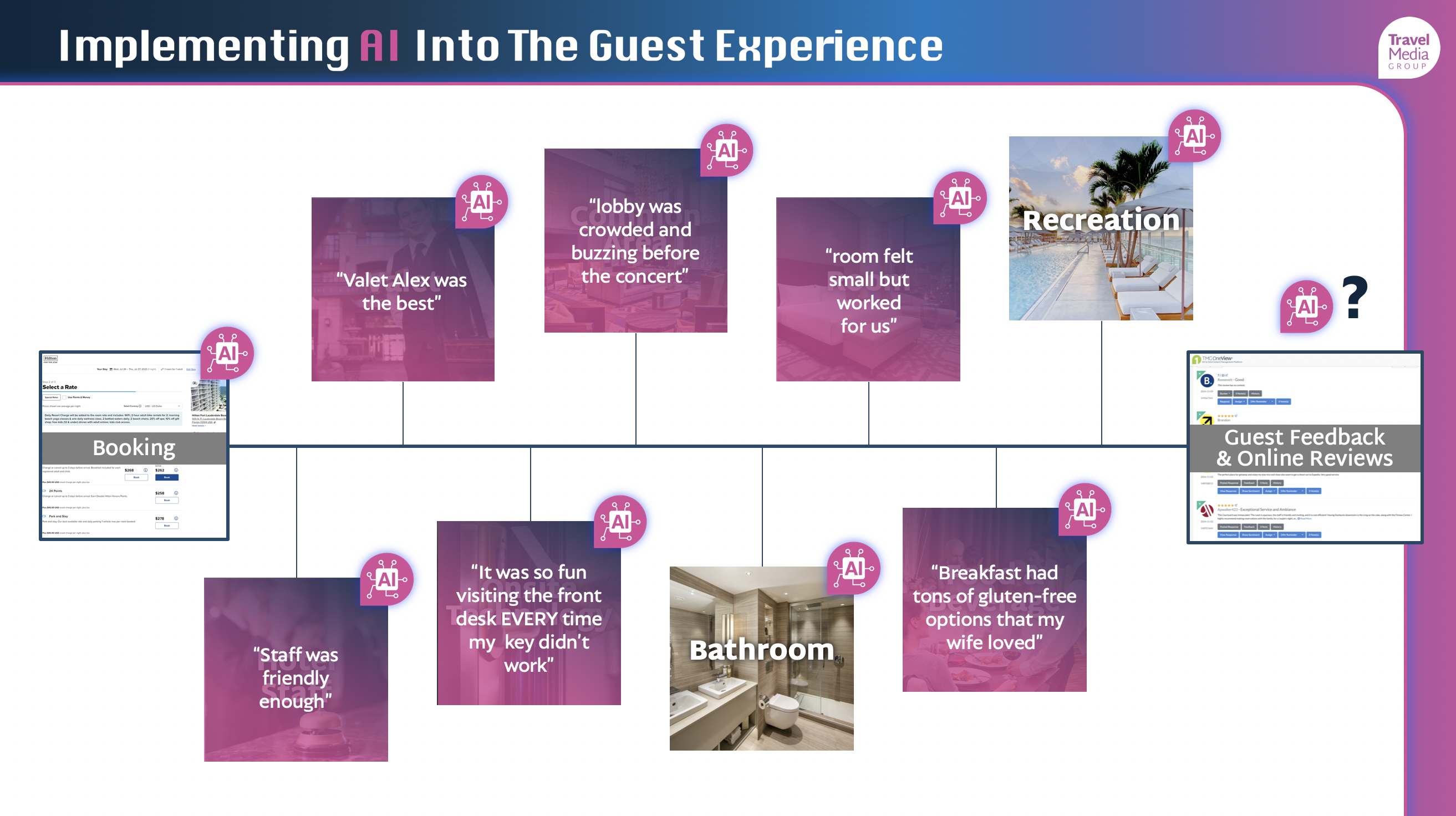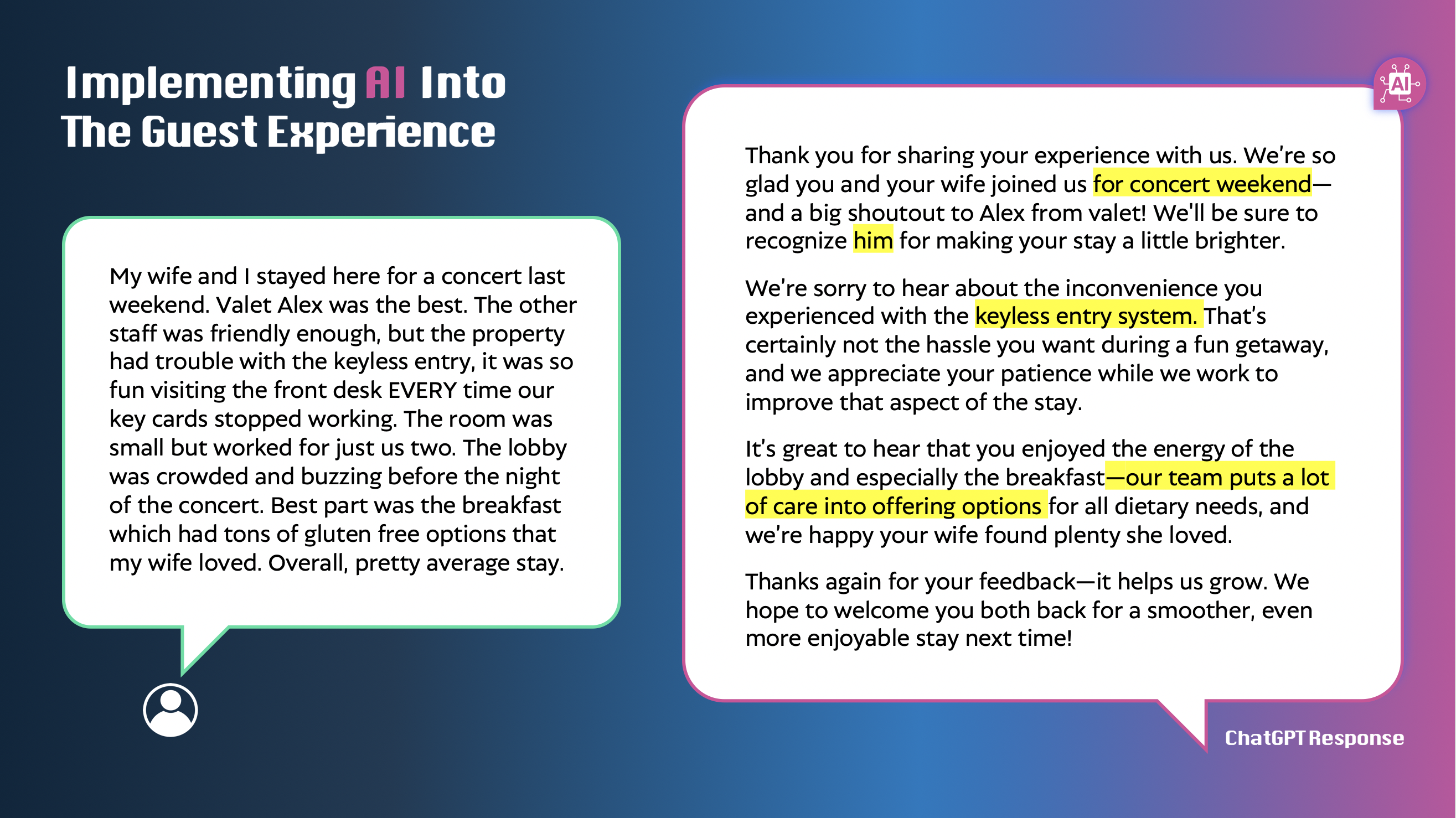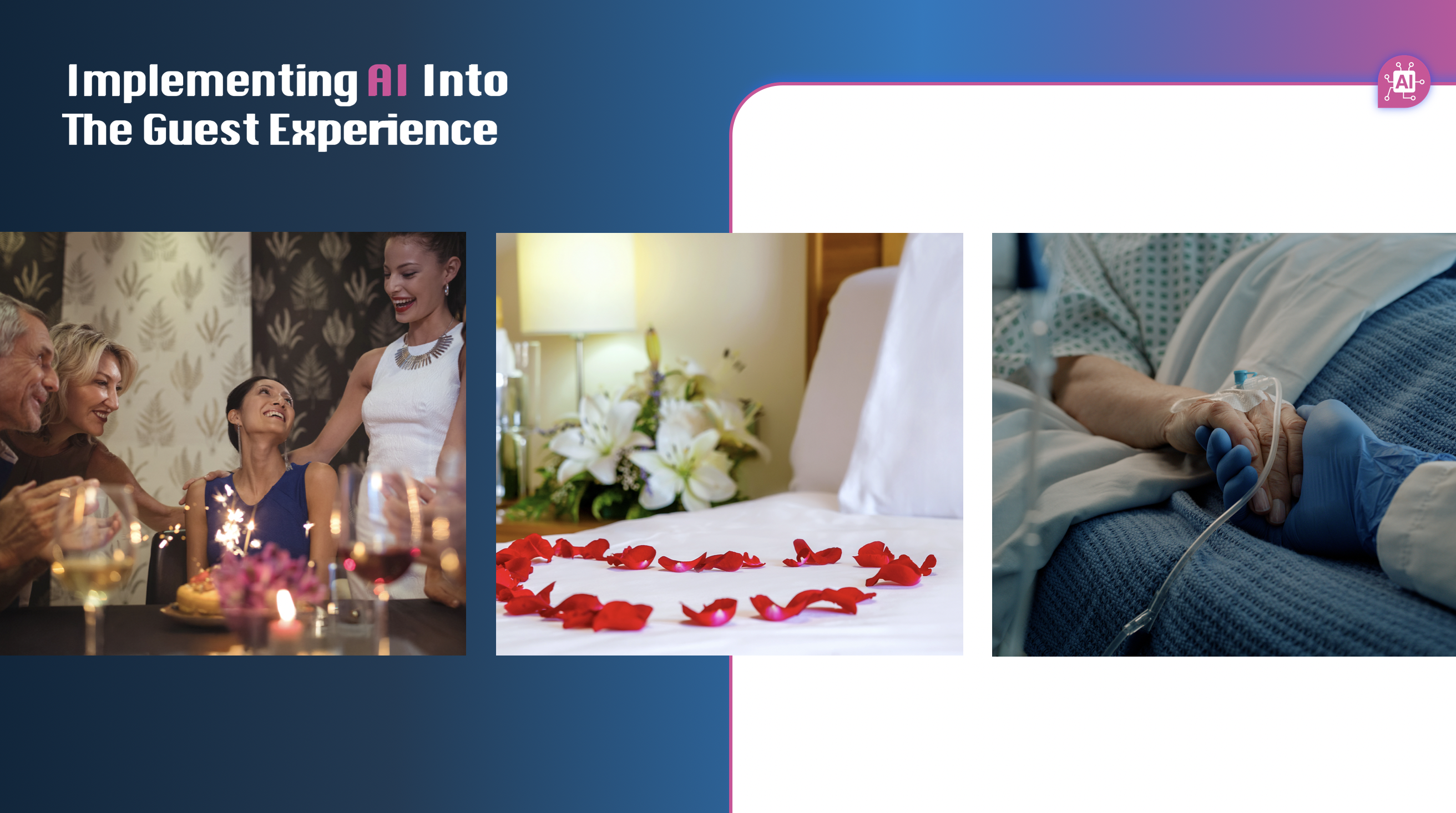AI & Guest Review Response: Latest Developments [Webinar]

Is all AI created equal? That is the big question to answer. You may be receiving pressure from higher-ups with questions like, “Are we implementing AI into the guest experience to make our hotel operations more efficient?” In this blog, we will discuss four questions to ask when considering using AI to respond to your reviews and four red flags to look out for in AI review responses. Furthermore, we will answer the question: “How good is AI at responding to reviews?”
In the image above, we notice a picture of a robot responding to reviews. We asked Chat GPT to create an image with the prompt “Hotel Responds to Review.” What we noticed is the 7-star scale it gave us. In hospitality, we work on a 5-star scale depending on the platform. This is one of the nuances with teaching AI; the things we take for granted haven’t been translated yet.
Not All AI Is Created Equal


To better understand the nuances of AI, we will use a parallel to baking. No matter what you are baking, you will need ingredients. There is a difference in ingredients; you can purchase store-bought, Great Value cake mix, or get high-quality individual ingredients. When we are talking about AI, the ingredients are our data. The data you input, whether generic or specific, has an impact.
Secondly, experience matters. An average person baking a cake won’t have as much success as a 20-year veteran baker. This can be the same for the model you are using. Using a toaster oven versus a kitchen-grade oven can affect the quality of your cake.
LLMs (large language models), including ChatGPT, CoPilot, etc., are designed to understand conversational language. They take this language in and use it to respond to a prompt or instructions based on what they know. The data that feeds into the LLM itself informs its understanding of language. In our context of reviews, we must consider how we are responding and the emotional base of the response. You also need to factor in the context, including the location, the amenities, etc. It comes down to your primary ingredients.
Implementing AI Into The Guest Experience

In hospitality, there is a lot of pressure to use AI in all aspects of the business. There is a sense of FOMO that you may not be using it to the fullest. Hoteliers are trying to figure out every single place in the guest experience to implement and incorporate AI.
The above image shows different aspects of a guest experience in one review. Some reviews may feature sarcasm, slang words, and specific names that could potentially trip up AI. All of these different areas of experience are being reflected in reviews. One important thing to remember is that LLMs are designed to understand speech. But, you are also constraining it down to the context of responding to a review. When we think about a review box, it’s wide open. People can say anything and everything, hotel-related or not. This is where things get very complex because this input is sometimes entirely random.

Above, we see the full review, accompanied by ChatGPT’s response. Overall, this is a very passable response. But some nuances trip you up. Specifics such as gender, standard terms, and tone of voice can make or break a review response. One key to these types of responses is that they can tip off someone who knows a real person might not have written this. While this is not a bad thing, it’s still essential to ensure you have that “expert baker” who is instructing the LLM to do the right thing and do it in a way conducive to your hotel’s voice.


While you may be able to live with this ChatGPT response, what happens when you have real issues at the property? Our Respond & Resolve™ data shows that properties have dealt with slips and falls, disagreements with the staff, accusations such as discrimination, payments, etc.
But on the other side of the spectrum, it’s the same. Whether it’s an anniversary, a birthday party, or visiting a sick family member at the local hospital, you don’t want to give them a “boxed cake” response. These are the places where personalized service can rise above. If we think about hospitality as a connection with our guests, it is important to communicate in a way that furthers our relationship with them. Even more so, this is an extension of their experience with you, your brand, and your location.
4 Questions to Ask When Considering Using AI To Respond To Your Reviews
1. Do your responses sound like AI?
When AI was relatively new, using it for responses or images seemed innovative and cool. As it progresses, we are becoming fluent in figuring out whether something is AI. How does this affect authenticity and genuine connection building? If guests sense that minimal effort went into the response, it can affect their feelings for your brand. That’s where understanding the technology and feeding it the right “ingredients” is crucial.
2. How is the response being posted online?
A 0% to 100% response rate sounds great, but if you still have to go in there, copy the response generated for you, and go back to the sites to copy and paste it, is that saving you time? There are a lot of AI solutions coming into the market.
3. How do you teach hospitality to AI?
Think about how much time it takes to teach your staff the nuances of your hotel and how you want your brand to sound through reviews. Many things in hospitality are different from other industries. This is why experience matters!
4. What is your reason for responding to reviews?
This is what we talk about to hoteliers, brands, and management companies every day. If you’re responding to reviews only to check a box, that AI response will do that job for you. However, if there is a deeper strategy of guest acquisition, retention, and advocacy, then the curated and professional response will be a better fit. Building on your guests’ advocacy and showing your gratitude or seeking a solution is what resonates with them and potential guests.
4 Red Flags to Look Out For With AI Review Response
🚩 There are no questions being asked about your property details: Be wary of partnering with a company that just enters the space because they may not fully understand the nuances of the hospitality industry. Every hotel is different. You have different breakfast hours, amenities, and policies. At TMG, we send a guideline preview so we can use your responses to tailor the review responses.
🚩 There is no human touch at all: This is extremely important to look out for. Even in our hybrid review response solution, Smart Response, there is a human at the final step to ensure that everything posted online is accurate and does not damage your reputation.
🚩 Repeating negative feedback in the response: AI is known to regurgitate keywords and phrases in the response. This is not good when a review mentions negative feedback because now, not only is it said once, but it’s also repeated by your property, which can have harmful SEO implications.
🚩 There’s no way to train your AI to respond better: Perfect calibration and a perfect frequency between your hotel’s voice and your response are impossible if you can’t train your AI. Our Respond and Resolve™ solution allows for in-tune collaboration. When something happens at your property, such as a broken elevator or renovations, it is much easier to pick up the phone and call someone who can adjust their responses, versus having to train an AI system to communicate that for you.
About TMG Respond & Resolve™
We have served the hospitality industry for over 40 years and have had the Respond and Resolve™ solution since 2016. We have created the Smart Response model, a hybrid solution, and the data we use is the 2 million+ review responses we have done for our hotel partners. But at the end of the day, what is better than having a team of experienced chefs build your cake? We are committed to providing your guests with the absolute best types of responses in the way you would want them done.





0 Comments